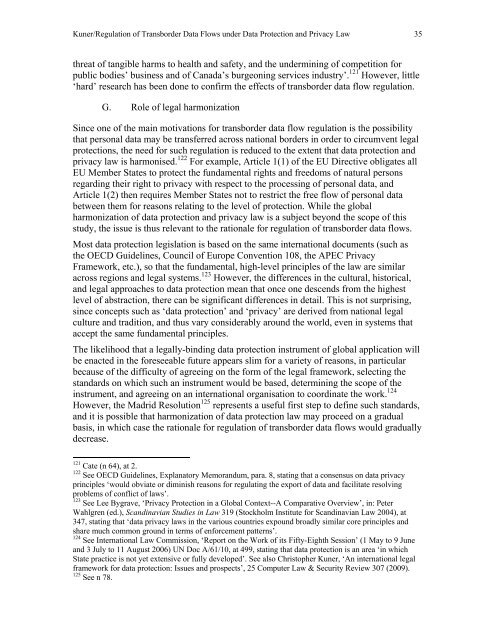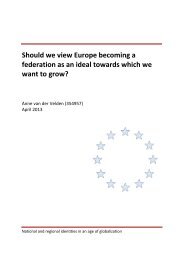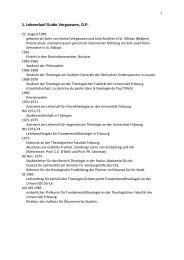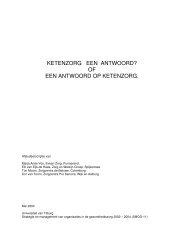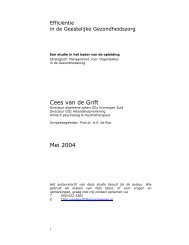Regulation of Transborder Data Flows under ... - Tilburg University
Regulation of Transborder Data Flows under ... - Tilburg University
Regulation of Transborder Data Flows under ... - Tilburg University
Create successful ePaper yourself
Turn your PDF publications into a flip-book with our unique Google optimized e-Paper software.
Kuner/<strong>Regulation</strong> <strong>of</strong> <strong>Transborder</strong> <strong>Data</strong> <strong>Flows</strong> <strong>under</strong> <strong>Data</strong> Protection and Privacy Law 35<br />
threat <strong>of</strong> tangible harms to health and safety, and the <strong>under</strong>mining <strong>of</strong> competition for<br />
public bodies’ business and <strong>of</strong> Canada’s burgeoning services industry’. 121 However, little<br />
‘hard’ research has been done to confirm the effects <strong>of</strong> transborder data flow regulation.<br />
G. Role <strong>of</strong> legal harmonization<br />
Since one <strong>of</strong> the main motivations for transborder data flow regulation is the possibility<br />
that personal data may be transferred across national borders in order to circumvent legal<br />
protections, the need for such regulation is reduced to the extent that data protection and<br />
privacy law is harmonised. 122 For example, Article 1(1) <strong>of</strong> the EU Directive obligates all<br />
EU Member States to protect the fundamental rights and freedoms <strong>of</strong> natural persons<br />
regarding their right to privacy with respect to the processing <strong>of</strong> personal data, and<br />
Article 1(2) then requires Member States not to restrict the free flow <strong>of</strong> personal data<br />
between them for reasons relating to the level <strong>of</strong> protection. While the global<br />
harmonization <strong>of</strong> data protection and privacy law is a subject beyond the scope <strong>of</strong> this<br />
study, the issue is thus relevant to the rationale for regulation <strong>of</strong> transborder data flows.<br />
Most data protection legislation is based on the same international documents (such as<br />
the OECD Guidelines, Council <strong>of</strong> Europe Convention 108, the APEC Privacy<br />
Framework, etc.), so that the fundamental, high-level principles <strong>of</strong> the law are similar<br />
across regions and legal systems. 123 However, the differences in the cultural, historical,<br />
and legal approaches to data protection mean that once one descends from the highest<br />
level <strong>of</strong> abstraction, there can be significant differences in detail. This is not surprising,<br />
since concepts such as ‘data protection’ and ‘privacy’ are derived from national legal<br />
culture and tradition, and thus vary considerably around the world, even in systems that<br />
accept the same fundamental principles.<br />
The likelihood that a legally-binding data protection instrument <strong>of</strong> global application will<br />
be enacted in the foreseeable future appears slim for a variety <strong>of</strong> reasons, in particular<br />
because <strong>of</strong> the difficulty <strong>of</strong> agreeing on the form <strong>of</strong> the legal framework, selecting the<br />
standards on which such an instrument would be based, determining the scope <strong>of</strong> the<br />
instrument, and agreeing on an international organisation to coordinate the work. 124<br />
However, the Madrid Resolution 125 represents a useful first step to define such standards,<br />
and it is possible that harmonization <strong>of</strong> data protection law may proceed on a gradual<br />
basis, in which case the rationale for regulation <strong>of</strong> transborder data flows would gradually<br />
decrease.<br />
121 Cate (n 64), at 2.<br />
122 See OECD Guidelines, Explanatory Memorandum, para. 8, stating that a consensus on data privacy<br />
principles ‘would obviate or diminish reasons for regulating the export <strong>of</strong> data and facilitate resolving<br />
problems <strong>of</strong> conflict <strong>of</strong> laws’.<br />
123 See Lee Bygrave, ‘Privacy Protection in a Global Context--A Comparative Overview’, in: Peter<br />
Wahlgren (ed.), Scandinavian Studies in Law 319 (Stockholm Institute for Scandinavian Law 2004), at<br />
347, stating that ‘data privacy laws in the various countries expound broadly similar core principles and<br />
share much common ground in terms <strong>of</strong> enforcement patterns’.<br />
124 See International Law Commission, ‘Report on the Work <strong>of</strong> its Fifty-Eighth Session’ (1 May to 9 June<br />
and 3 July to 11 August 2006) UN Doc A/61/10, at 499, stating that data protection is an area ‘in which<br />
State practice is not yet extensive or fully developed’. See also Christopher Kuner, ‘An international legal<br />
framework for data protection: Issues and prospects’, 25 Computer Law & Security Review 307 (2009).<br />
125 See n 78.


